GCT综合英语第7单元课文翻译
- 格式:doc
- 大小:48.50 KB
- 文档页数:8
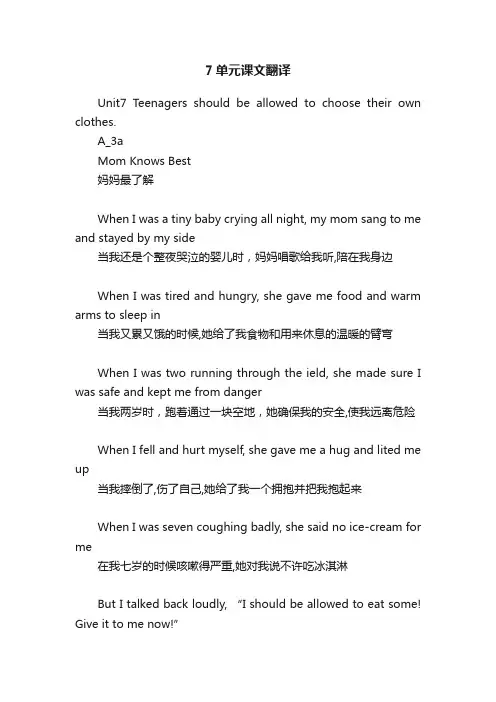
7单元课文翻译Unit7 Teenagers should be allowed to choose their own clothes.A_3aMom Knows Best妈妈最了解When I was a tiny baby crying all night, my mom sang to me and stayed by my side当我还是个整夜哭泣的婴儿时,妈妈唱歌给我听,陪在我身边When I was tired and hungry, she gave me food and warm arms to sleep in当我又累又饿的时候,她给了我食物和用来休息的温暖的臂弯When I was two running through the ield, she made sure I was safe and kept me from danger当我两岁时,跑着通过一块空地,她确保我的安全,使我远离危险When I fell and hurt myself, she gave me a hug and lited me up当我摔倒了,伤了自己,她给了我一个拥抱并把我抱起来When I was seven coughing badly, she said no ice-cream for me在我七岁的时候咳嗽得严重,她对我说不许吃冰淇淋But I talked back loudly, “I should be allowed to eat some! Give it to me now!”但是我大声地对她说,“应该允许我吃一些!现在就给我!”When I was nine watching scary movies, she said it’d give me awful dreams九岁的时候,当我看恐怖电影时,她说这会让我做噩梦But I shouted back angrily, “I should be allowed to watch it! I’m not a baby!”但是我愤怒地吼道,“应该允许我看这个!我不再是一个孩子了!”When I was a te en going out with riends, she said, “Please be back by ten!”当我十几岁与朋友们外出时,她说,“请十点之前回家!”But I talked back again ― “I should not be told what to do! I’m seventeen now!”但我与她顶嘴――”不应由谁告诉我该做什么!我现在十七岁了!”Now I’m an adult, thinking back to those times现在我是一个成年人了,回想那些时光I coughed for days ater eating that ice-cream在吃了冰淇淋后,我咳嗽了好几天And had scary dreams ater watching that film看了那个电影后,做了很多噩梦I was late for school rom staying out past ten在外面呆到了十点之后,我上学迟到了I regret talking back, not listening to Mom我后悔与妈妈顶嘴,没有听妈妈的话Mom knows best, and for me she wanted only the best!妈妈知道的最多,她只想给我最好的!B_2bShould I Be Allowed to Make My Own Decisions?应该允许我自己做决定吗?Many teenagers have hobbies.许多青少年都有爱好。
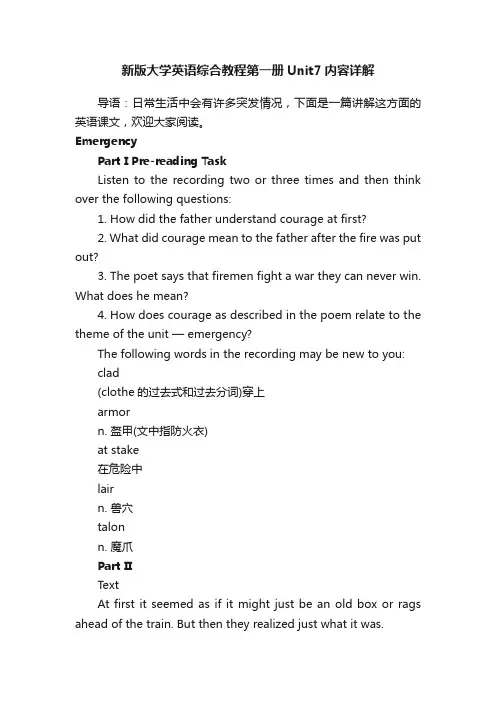
新版大学英语综合教程第一册Unit7内容详解导语:日常生活中会有许多突发情况,下面是一篇讲解这方面的英语课文,欢迎大家阅读。
EmergencyPart I Pre-reading TaskListen to the recording two or three times and then think over the following questions:1. How did the father understand courage at first?2. What did courage mean to the father after the fire was put out?3. The poet says that firemen fight a war they can never win. What does he mean?4. How does courage as described in the poem relate to the theme of the unit — emergency?The following words in the recording may be new to you:clad(clothe的过去式和过去分词)穿上armorn. 盔甲(文中指防火衣)at stake在危险中lairn. 兽穴talonn. 魔爪Part IITextAt first it seemed as if it might just be an old box or rags ahead of the train. But then they realized just what it was."KIDS ON THE TRACK!"Jack MurphyMonday, May 1, 1989 was a pleasant morning in Ramsey, N.J. Kate Pritchard bent over her car trunk and struggled with the bags of groceries she'd just brought home. She heard the distant cry of a locomotive horn. The trains of Conrail passed less than 300 feet from the Pritchards' house. No fence separated their backyard from the track — only a thick row of trees. But, her sons, 3(1/2)-year-old Todd and 18-month-old Scott, were nearby, playing on the driveway."Stay right there," Kate said, "while Mommy puts the groceries away. Then we'll go inside and have lunch, okay?""Okay!" said Todd, giving a thumbs-up gesture he'd seen his father make."Okay!" echoed Scott, trying to copy his older brother.They watched their mother enter the house with several bags.Kate shut the refrigerator and hurried outside. Good. The boys were playing right where she'd left them.As she lifted more bags from the trunk, Kate heard a train race past — a passenger express, she judged from its speed. She carried more bags into the house.The sounds of the train apparently drew the boys' attention to the track. After making their way through the trees, they climbed to the top of the steep roadbed, knelt down along the railroad and began to play.A few thousand feet west, a freight train rolled slowly toward the children. Overhead lights signaled to engineer Rich Campana that the passenger train ahead was out of the way, and they could resume their normal speed of 40 miles per hour. The engineer adjusted the accelerator, then turned to conductor Anthony Falzo,a man, medium in height and strongly built, who had worked for Conrail for almost half of his 35 years."So what'd you do over the weekend, Anthony?""Oh, not much. Mostly messing around — a little TV, then bed. What else?"Campana smiled. "Hey, you'd better cool down, Anthony —you're getting to be a real party animal!"The two men laughed. They were still laughing as the train began gathering speed, moving at 21 miles per hour.Rich and Anthony spotted something ahead at the same instant."What's that up there?" asked the engineer. Anthony didn't answer. Staring intently, he was trying to identify the curious shape on the track ahead. A box? Old rags?Suddenly both men realized what it was. Rich threw on the emergency brake and pulled on the air-horn handle with all his strength.The horn's blast and Anthony's words exploded at the same time: "Kids on the Track!"Anthony sprang through the cab door onto a narrow running board six feet above the wheels and raced to the front of the swaying train. Climbing quickly down a steel ladder, he paused at the bottom, two feet above the roadbed flashing by.Now he could clearly see the two little children. They were sitting alongside the rail. Anthony waved wildly and shouted, "Get away! Get away!"He mentally calculated the train's deceleration rate and groaned. We'll never stop in time.Absorbed in play, Todd and Scott did not hear the train. Finally, as the sound became thunderous, Scott looked up andfroze.Though the train was slowing, Anthony knew it was still going faster than he could run. So he forced himself to wait until he would be close enough to leap off and grab the boys. With perhaps ten feet left between them and the sharp-edged snowplow blade at the front of the train, Anthony sprang forward from the ladder. Landing on the loose, fist-size stones alongside the track, he had to struggle to keep his balance. In two giant steps he almost reached the children. They stared up at him in wide-eyed shock. Anthony, throwing his body into space, flew toward them.The unending blast of the train horn struck Kate Pritchard like a hammer blow. "The boys! " she cried, and raced out the door. They were gone!The track, she thought. I must get to the track!As his body crashed downward, Anthony covered Todd while reaching out with one arm to grab Scott and pull him clear of the track. But the train had caught up to them. Anthony saw the black steel edge of the snowplow blade hit the young child under the chin, driving his head back and scraping over his face. Instantly, blood flashed across the boy's forehead.Part of the train then punched into the back of Anthony's work jacket, tearing the nylon fabric. Still, Anthony managed to pull Scott completely under him.He's dead, Anthony thought. He felt sick with horror. Burying his face in the stones, he pushed downward on the two boys with all his strength as the train passed inches above them.The first person Kate saw when she reached the halted train was Todd. Her older boy was jumping up and down and crying uncontrollably. But Kate could see he wasn't injured. She grabbedand hugged him. Then she saw the still figure of a man lying under the third car. Scott's head, a mask of darkening blood, was visible under him. Kate ran to them. "Scott!" she screamed.Anthony twisted to face her. "Lady," he said, his voice calm, "go to your house. Call the police and ambulance." Kate, only half hearing him, extended her arms to take her baby. Anthony spoke again, more sharply, "Ma'am, listen! Go to your house and call the police — call an ambulance. Go!"Kate tore back to the house, made the calls, then reached her husband, Gary, via his beeper.When the first police car arrived, Anthony was still holding little Scott. The conductor knew from the child's cries that he was alive, but Scott might have internal injuries that any movement could worsen. So Anthony insisted the emergency personnel check the boy before he would release his grip. Miraculously, Scott's injuries were not serious, requiring just 13 stitches.There had only been 14 inches between the plow blade and the ground. Reporters later asked Anthony if he had hesitated before risking his life."No," he replied. "All I could think was that those two little kids have their whole lives still ahead of them, and if I do nothing, they're dead. There was no way I could let that happen."Soon after the incident, Anthony visited the Pritchards' home. He recalls putting his arms around Todd and Scott and lifting them. "It made me remember the moment when I first sheltered them under the train. It was a strange feeling, holding them again — and wonderful too."Since that first visit, the Pritchards say that Anthony has almost become a member of the family. They also report that a fence now separates their neighborhood from the railroad track.New Words and Expressionstrunkn. 汽车后部的行李箱struggle withhave difficulty handling or coping with 费力地对付groceryn. (usu. pl) 食品杂货locomotiven. 机车hornn. 喇叭nearbya., ad. 附近的;在附近thumbs-upn. 翘拇指(赞同或满意的表示)gesturen. 手势;姿势echov. repeat (another's words, ideas, etc.) 重复draw sb.'s attention tomake sb. aware of (sth.) 引起(某人)注意steepa. rising or falling sharply 陡峭的kneelvi. go down on the knees; rest on the knees 跪下;跪着freightn. 货物;货运overheada. above one's head; in the sky 在上头的;架空的signalv. send ( sth. such as a warning or a message) by a light or an act 发信号传达out of the way远离,不碍事resumevt. begin again after a pause 重新开始,恢复perprep. for each 每acceleratorn. 加速器,加速装置conductorn. (AmE) 列车员mediuma. coming halfway between; not extreme 中等的n. a means which can be used to express or communicate sth. 媒质,媒介messvt. put into disorder 弄乱;弄脏n. 混乱;脏乱mess around(infml) do things in an aimless way; spend time playing 随意做事;闲荡heyint. 嗨(用以唤起注意等)cool down(cause to) become calmer (使)冷静下来spotvt. see or recognize 看出,认出instantn. 片刻,瞬息intentlyad. with great attention 专心地ragn. 破布;抹布;(pl)破旧衣服braken. 制动器,刹车pull on用力拉with all one's strength使劲,用全力blastn. (汽笛等的)鸣叫explodevi. burst with a loud noise 爆发;爆炸swayv. (cause to)move or swing slowly from side to side (使)摇动;(使)摇摆flashvi. move very fast; produce a sudden bright light 飞驰,掠过;闪烁calculatev. 计算decelerationn. 减速groan▲v. 呻吟thunderousa. extremely loud 雷鸣似的;极响的leapvi. jump 跳,跃grabv. seize suddenly; take roughly and quickly 猛地抓取bladen. 刀刃,刀身;刀片loosea. 松散的hammern. 榔头,锤crashvi. fall or strike suddenly, violently, and noisily 突然重重倒下;坠毁;碰撞reach outstretch one's arm, usu. in order to get or touch (sth.) 伸手抓clear offree from, not in contact with 离开;不接触scrapev. 刮,擦instantlyad. at once; immediately 立即,即刻foreheadn. 前额punchv. hit hard 猛击,用力击nylonn. 尼龙fabricn. 织物,织品;构造,结构horrorn. great fear or shock 恐惧,震惊up and down一上一下地injurevt. harm, hurt;damage 损害;伤害injury n.hug▲vt. hold tightly in one's arms 紧抱maskn. 面具,面罩visiblea. that can be seen 看得见的,可见的twistv. 转动;(使)扭曲;扭伤ambulancen. 救护车ma'am = madam女士,小姐viaprep. by means of; by way of 通过;经过beepern. BP机,拷机internala. of or in the inside 内部的;内在的miraculouslyad. like a miracle 奇迹般地stitch▲n. (缝合伤口、缝纫、刺绣等的)一针,针脚riskvt. put (sth.) in a dangerous position 使遭受危险n. 危险,风险no way(infml) in no way; definitely not 不行;决不incidentn. sth. that happens 事情;事件sheltervt. protect; cover 保护;遮蔽n. 隐蔽处;躲避处Proper NamesJack Murphy杰克·墨菲Ramsey拉姆齐(地名)N.J.= New Jersey(美国)新泽西州Kate Pritchard凯特·普理查德Conrail联铁(一家主要在美国东北部营运的铁路公司,Consolidated Rail Corporation的缩合词)Todd托德(男子名或姓氏)Scott斯科特(男子名或姓氏)Rich Campana里奇·坎普纳Anthony Falzo安东尼·法尔佐Gary加里(男子名或姓氏)向你推荐的相关文章相关文章列表微信扫码分享。
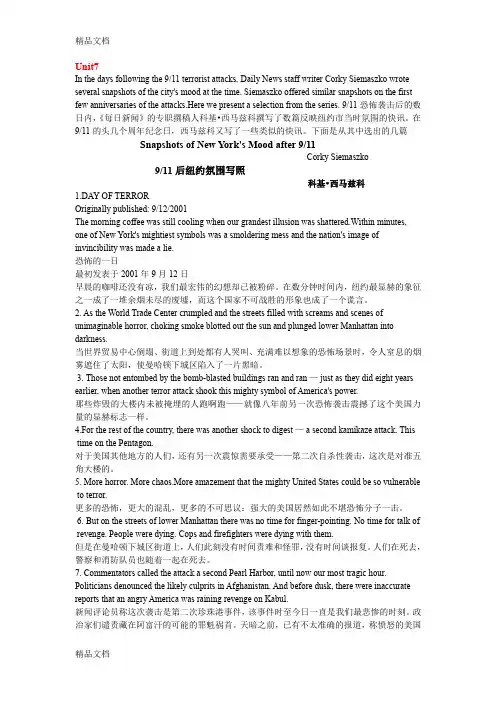
Unit7In the days following the 9/11 terrorist attacks, Daily News staff writer Corky Siemaszko wrote several snapshots of the city's mood at the time. Siemaszko offered similar snapshots on the first few anniversaries of the attacks.Here we present a selection from the series. 9/11恐怖袭击后的数日内,《每日新闻》的专职撰稿人科基•西马兹科撰写了数篇反映纽约市当时氛围的快讯。
在9/11的头几个周年纪念日,西马兹科又写了一些类似的快讯。
下面是从其中选出的几篇Snapshots of New York's Mood after 9/11Corky Siemaszko9/11后纽约氛围写照科基•西马兹科1.DAY OF TERROROriginally published: 9/12/2001The morning coffee was still cooling when our grandest illusion was shattered.Within minutes, one of New York's mightiest symbols was a smoldering mess and the nation's image of invincibility was made a lie.恐怖的一日最初发表于2001年9月12日早晨的咖啡还没有凉,我们最宏伟的幻想却已被粉碎。
在数分钟时间内,纽约最显赫的象征之一成了一堆余烟未尽的废墟,而这个国家不可战胜的形象也成了一个谎言。
2. As the World Trade Center crumpled and the streets filled with screams and scenes of unimaginable horror, choking smoke blotted out the sun and plunged lower Manhattan into darkness.当世界贸易中心倒塌、街道上到处都有人哭叫、充满难以想象的恐怖场景时,令人窒息的烟雾遮住了太阳,使曼哈顿下城区陷入了一片黑暗。
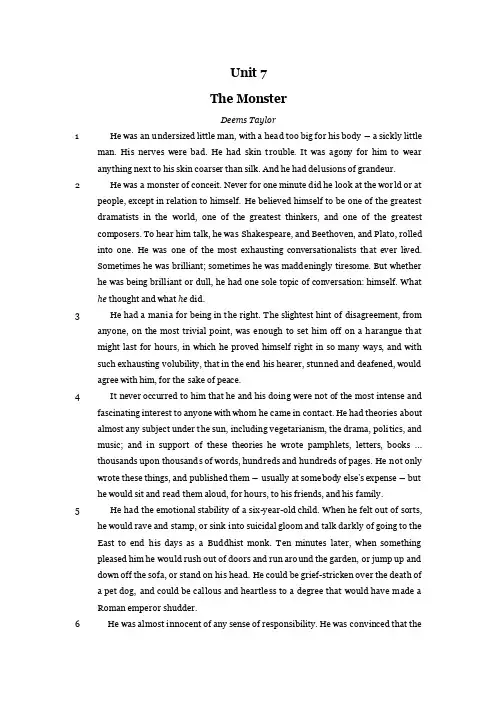
Unit 7The Monst erDeems Taylor1He was an un dersized littleman, with a head too big for his body ― a sickly little man. His nerves were bad. He had skin tr ouble. It was ag ony for him to w ear anything nex t to his skin co arser than silk. And he had delu sions of grandeu r.2He was amonster of conce it. Never for on e minute did helook at the worl d or at people,except in relati on to himself. H e believed himse lf to be one ofthe greatest dra matists in the w orld, one of the greatest thinke rs, and one of t he greatest comp osers. To hear h im talk, he wasShakespeare, and Beethoven, andPlato, rolled in to one. He was o ne of the most e xhausting conver sationalists tha t ever lived.So metimes he was b rilliant; someti mes he was madde ningly tiresome. But whether hewas being brilli ant or dull, hehad one sole top ic of conversati on: himself. Wha t he thought and what he did.3He had a mania for being in th e right. The sli ghtest hint of d isagreement, fro m anyone, on the most trivial po int, was enoughto set him off o n a harangue tha t might last for hours, in which he proved himse lf right in so m any ways, and wi th such exhausti ng volubility, t hat in the end h is hearer, stunn ed and deafened, would agree wit h him, for the s ake of peace.4It never occur red to him thathe and his doing were not of the most intense an d fascinating in terest to anyone with whom he ca me in contact. H e had theories a bout almost anysubject under th e sun, including vegetarianism,the drama, polit ics, and music;and in support o f these theories he wrote pamphl ets, letters, bo oks ...thousand s upon thousands of words, hundr eds and hundreds of pages. He no t only wrote the se things, and p ublish ed them ―usually at someb ody else’s expen se ― but he woul d sit and read t hem aloud, for h ours, to his fri ends, and his fa mily.5He had the emotional s tability of a si x-year-old child. When he felt o ut of sorts, hewould rave and s tamp, or sink in to suicidal gloo m and talk darkl y of going to th e East to end hi s days as a Budd hist monk. Ten m inutes later, wh en something ple ased him he woul d rush out of do ors and run arou nd the garden, o r jump up and do wn off the sofa, or stand on his head. He couldbe grief-stricke n over the death ofa pet dog, a nd could be call ous and heartles s to a degree th at would have ma de aRoman emper or shudder.6He was almost in nocent of any se nse of responsib ility. He was co nvinced that theworld owed hima living. In sup port of this bel ief, he borrowed money from ever ybody who was go od for a loan ―men, women, frie nds, or stranger s. He wrote begg ing letters by t he score, someti mes groveling wi thout shame, atothers loftily o ffering his inte nded benefactorthe privilege of contributing to his support, an d being mortally offended if the recipient decli ned the honor.7What money he could lay his h and on he spentlike an Indian r ajah. No one wil l ever know ― ce rtainly he never knows ― how muc h money he owed. We do know that his greatest be nefactor gave hi m $6,000 to paythe most pressin g of his debts i n one city, anda year later had to give him $16,000 to enable h im to live in an other city witho ut being throwninto jail for de bt.8He was e qually unscrupul ous in other way s. An endless pr ocession of wome n marched throug h his life. Hisfirst wife spent twenty years en during and forgi ving his infidel ities. His secon d wife had beenthe wife of hismost devoted fri end and admirer, from whom he st ole her. And eve n while he was t rying to persuad e her to leave h er first husband he was writingto a friend to i nquire whether h e could suggestsome wealthy wom an ― any wealt hy woman ― whom he could marry for her money.9He had a geniusfor making enemi es. He would ins ult a man who di sagreed with him about the weath er. He would pul l endless wiresin order to meet some man who ad mired his work a nd was able andanxious to be of use to him ― an d would proceedto make a mortal enemy of him wi th some idioticand wholly uncal led-for exhibiti on of arroganceand bad manners. A character inone of his opera s was a caricatu re of one of the most powerful m usic critics ofhis day. Not con tent with burles quing him, he in vited the critic to his house an d read him the l ibretto aloud in front of his fr iends.10The n ame of this mons ter was RichardWagner. Everythi ng I have said a bout him you can find on record― in newspapers, in police repor ts, in the testi mony of people w ho knew him, inhis own letters, between the lin es of his autobi ography.And the curious thing a bout this record is that it does n’t matter in th e least.11Bec ause this unders ized, sickly, di sagreeable, fasc inating little m an was right all the time, the j oke was on us. H e was one of the world’s greates t dramatists; he was a great thi nker; he was one of the most stu pendous musicalgeniuses that, u p to now, the wo rld has ever see n. The world did owe him a livin g. What if he di d talk about him self all the tim e? If he talkedabout himself fo r twenty-four ho urs every day fo r the span of hi s life he wouldnot have uttered half the number of words that o thermen have sp oken and written about him since his death.12When you conside r what he wrote― thirteen opera s and music dram as, eleven of th em still holding the stage, eigh t of them unques tionably worth r anking among the wor ld’s great m usico-dramatic m asterpieces ― wh en you listen to what he wrote,the debts and he artaches that pe ople had to endu re from him don’t seem much of a price.13W hat if he was fa ithless to his f riends and to hi s wives? He hadone mistress towhom he was fait hful to the dayof his death: Mu sic. Not for a s ingle moment did he ever comprom ise with what he believed, withwhat he dreamed. There is not aline of his musi c that could hav e been conceived by a little min d. Even when heis dull, or down right bad, he is dull in the gra nd manner. Liste ning to his musi c, one does notforgive him forwhat he may or m ay not have been. It is not a ma tter of forgiven ess. It is a mat ter of being dum b with wonder th at his poor brai n and body didn’t burst under th e torment of the demon of creati ve energy that l ived inside him, struggling, cla wing, scratching to be released; tearing, shriek ing at him to wr ite the music th at was in him. T he miracle is th at what he did i n the little spa ce of seventy ye ars could have b een done at all, even by a great genius. Is it a ny wonder he had no time to be a man?畸人迪姆斯·泰勒1 他是个大头小身体、病怏怏的矬子;成日神经兮兮,皮肤也有毛病。
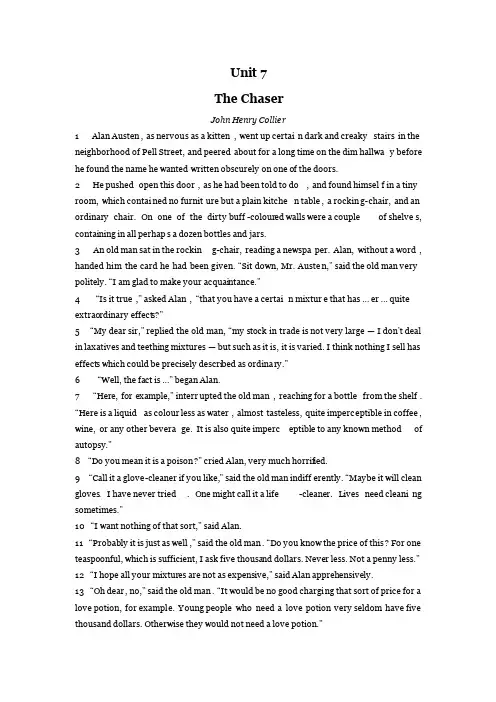
Unit 7The ChaserJohn Henry Collier1 Alan Austen, as nervous as a kitten, went up certain dark and creakystairsin the neighbo rhoodof Pell Street, and peeredabout for a long time on the dim hallway beforehe found the name he wantedwritten obscure ly on one of the doors.2 He pushedopen this door, as he had been told to do, and found himself in a tiny room, which contain ed no furnitu re but a plain kitchen table, a rocking-chair, and an ordinar y chair. On one of the dirty buff-coloure d walls were a coupleof shelves, contain ing in all perhaps a dozen bottles and jars.3 An old man sat in the rocking-chair, reading a newspap er. Alan, without a word, handedhim the card he had been given. “Sit down, Mr. Auste n,” said the old man very politel y. “I am glad to make your acquain tance.”4 “Is it true,” asked Alan, “that you have a certain mixture that has … er … quite extraor dinary effects?”5 “My dear sir,” replied the old man, “my stock in trade is not very large —I don’t deal in laxativ es and teethin g mixture s — but such as it is, it is varied. I think nothing I sell has effects which could be precise ly describ ed as ordinar y.”6 “Well, the fact is …” began Alan.7 “Here, for exa mple,” interru pted the old man, reachin g for a bottlefrom the shelf. “Here is a liquidas colourl ess as water, almosttastele ss, quite imperce ptible in coffee, wine, or any other beverag e. It is also quite imperce ptible to any known methodof autopsy.”8 “Do you mean it is a poison?” cried Alan, very much horrifi ed.9 “Call it a glove-cleaner if you like,” said the old man indiffe rently. “Maybe it will clean gloves.I have never tried. One might call it a life-cleaner. Lives need cleanin g sometim es.”10 “I want nothing of that sort,” said Alan.11 “Probabl y it is just as well,” said the old man. “Do you know the price of this? For one teaspoo nful, which is suffici ent, I ask five thousan d dollars. Never less. Not a penny less.”12 “I hope all your mixture s are not as expensi ve,” said Alan apprehe nsivel y.13 “Oh dear, no,” said the old man. “It would be no good chargin g that sort of price for a love potion, for example. Young peoplewho need a love potionvery seldomhave five thousan d dollars. Otherwi se they would not need a love potion.”14 “I am glad to hear that,” said Alan.15 “I look at it like this,” said the old man. “Pleasea custome r with one article, and he will come back when he needs another. Even if it is more costly. He will save up for it, if necessa ry.”16 “So,” said Alan, “you reallydo sell love potions?”17 “If I did not sell love potions,” said the old man, reachin g for another bottle,“I shouldnot have mention ed the other matterto you. It is only when one is in a positio n to obligethat one can affordto be so confide ntial. “18 “And these potions,” said Alan. “They are not just … just … er …”19 “Oh, no,” said the old man. “Their effects are permane nt, and extendfar beyondthe mere casualimpulse. But they include it. Oh, yes they include it. Bountif ully, insiste ntly. Everlas tingly.”20 “Dear me!” said Alan, attempt ing a look of scienti fic detachm ent. “How very interes ting!”21 “But conside r the spiritu al side,” said the old man.22 “I do, indeed,” said Alan.23 “For indiffe rence,” said the old man, “they substit ute devotio n. For scorn, adorati on. Give one tiny measure of this to the young lady — its flavour is imperce ptible in orangejuice, soup, or cocktai ls — and however gay and giddy she is, she will changealtoget her. She will want nothing but solitud e and you.”24 “I can hardlybelieve it,” said Alan. “She is so fond of parties.”25 “She will not like them anymore,” said the old man. “She will be afraidof the prettygirls you may meet.”26 “She will actuall y be jealous?” cried Alan in a rapture. “Of me?”27 “Yes, she will want to be everyth ing to you.”28 “She is, already. Only she doesn’t care about it.”29 “She will, when she has taken this. She will care intense ly. You will be her sole interes t in life.”30 “Wonderf ul!” cried Alan.31 “She will want to know all you do,” said the old man. “All tha t has happene d to you duringthe day. Every word of it. She will want to know what you are thinkin g about, why you smile suddenl y, why you are looking sad.”32 “That is love!” cried Alan.33 “Yes,” said the old man. “How careful ly she will look after you! She will never allow you to be tired, to sit in a draught, to neglect your food. If you are an hour late, she will be terrifi ed. She will think you are killed, or that some siren has caughtyou.”34 “I can hardlyimagine Diana like that!” cried Alan, overwhe lmed with joy.35 “You will not have to use your imagina tion,” said the old man. “And, by the way, since there are alwayssirens, if by any chanceyou should, later on, slip a little, you need not worry. She will forgive you, in the end. She will be terribl y hurt, of course, but she will forgive you —in the end.”36 “That will not happen,” said Alan fervent ly.37 “Of coursenot,” said the old man. “But, if it did, you need not worry. She would never divorce you. Oh, no! And, of course,she will never give you the least, the very least, grounds for —uneasin ess.”38 “And how much,” said Alan, “is this wonderf ul mixture?”39 “It is not as dear,” said the old man, “as the glove-cleaner, or life-cleaner, as I sometim es call it. No. That is five thousan d dollars, never a penny less. One has to be older than you are, to indulge in that sort of thing. One has to save up for it.”40 “But the love potion?” said Alan.41 “Oh, that,” said the old ma n, opening the drawerin the kitchen table, and takingouta tiny, ratherdirty-looking phial. “That is just a dollar.”42 “I can’t tell you how gratefu l I am,” said Alan, watchin g him fill it.43 “I like to oblige,” said the old man. “Then custome rs come back, later in life, when they are betteroff, and want more expensi ve things. Here you are. You will find it very effecti ve.”44 “Thank you again,” said Alan. “Good-bye.”45 “Au revoir,” said the man.解酒水艾伦·奥斯丁,紧张得像只小猫,心里七上八下、忐忑不安的进了裴尔街区的一个楼道,黑乎乎的楼梯咯吱咯吱直响。
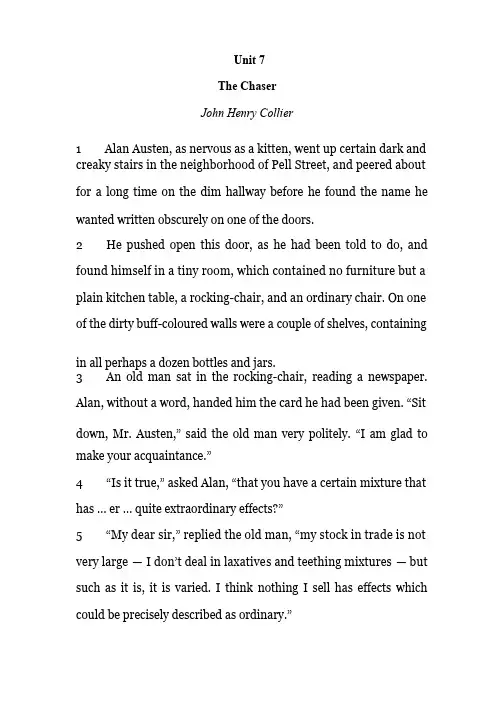
Unit 7The ChaserJohn Henry Collier1Alan Austen, as nervous as a kitten, went up certain dark and creaky stairs in the neighborhood of Pell Street, and peered about for a long time on the dim hallway before he found the name he wanted written obscurely on one of the doors.2He pushed open this door, as he had been told to do, and found himself in a tiny room, which contained no furniture but a plain kitchen table, a rocking-chair, and an ordinary chair. On one of the dirty buff-coloured walls were a couple of shelves, containing in all perhaps a dozen bottles and jars.3An old man sat in the rocking-chair, reading a newspaper. Alan, without a word, handed him the card he had been given. “Sit down, Mr. Austen,” said the old man very politely. “I am glad to make your acquaintance.”4“Is it true,” asked Alan, “that you have a certain mixture that has … er … quite extraordinary effects?”5“My dear sir,” replied the old man, “my stock in trade is not very large very large —— I don’t deal in laxative I don’t deal in laxatives and teething mixtures s and teething mixtures — but such as it is, it is varied. I think nothing I sell has effects which could be precisely described as ordinary.”6“Well, the fact is …” began Alan. 7“Here, for example,” interrupted the old man, reaching for a bottle from the shelf. “Here is a liquid as colourless as water, almost tasteless, quite imperceptible in coffee, wine, or any other beverage. It is also quite imperceptible to any known method of autopsy.”8“Do you mean it is a poison?” cried Alan, very muc much h horrified.9“Call it a glove glove--cleaner if you like,” said the old man indifferently. “Maybe it will clean gloves. I have never tried. One might call it a life-might call it a life-cleaner. Lives need cleaning sometimes.” cleaner. Lives need cleaning sometimes.” 10“I want nothing of that sort,” said Alan. 11“Probably it is just as well,” said the old man. “Do you know the price of this? For one teaspoonful, which is sufficient, I ask five thousand dollars. Never less. Not a penny less.”12“I hope all your mixtures are not as expensive,” said Alan apprehensively.13“Oh dear, no,” said the old man. “It would be no good charging that sort of price for a love potion, for example. Young people who need a love potion very seldom have five thousand dollars. Otherwise they would not need a love potion.” 14“I am glad to hear that,” said Alan.15“I look at it like this,” said the old man. “Please a customer with one article, and he will come back when he needs another. Even if it is more costly. He will save up for it, if necessary.” 16“So,” said Alan, “you really do sell love potions?” 17“If I did not sell love potions,” said the old man, reaching for another bottle, “I should not have mentioned the other matter to you. It is only when one is in a position to oblige that one can afford to be so afford to be so confidential. “ confidential. “18“And these potions,” said Alan. “They are not just … just … er …”19“Oh, no,” said the old man. “Their effects are permanent, and extend far beyond the mere casual impulse. But they include it. Oh, yes they include it. Bountifull yes they include it. Bountifully, insistently. Everlastingly.” y, insistently. Everlastingly.” 20“Dear me!” said Alan, attempting a look of scientific detachment. “How very interesting!”21“But consider the spiritual side,” said the old man. 22“I do, indeed,” said Alan. 23“For indifference,” said the old man, “they substitute devotion. For scorn, adoration. Give one tiny measure of this to the young lady young lady —— its flavour is imperceptible in orange juice, soup, or cocktails — and however gay and giddy she is, she will change altogether. She will want nothin altogether. She will want nothing but solitude and you.” g but solitude and you.”24“I can hardly believe it,” said Alan. “She is so fond of parties.” 25“She will not like them anymore,” said the old man. “She will be afraid of the pretty girls you may meet.”26“She will actually be jealous?” cried Alan in a rapture. “Of me?”27“Yes, she will want to be everything to you.” 28“She is, already. Only she doesn’t care about it.” 29“She will, when she has taken this. She will care intensely. You will be her sole interest in life.”30“Wonderful!” cried Alan. 31“She will want to know all you do,” said the old man. “All that has happened to you during the day. Every word of it. She will want to know what you are thinking about, why you smile suddenly, why you are looking sad.”32“That is love!” cried Alan. 33“Yes,” said the old man. “How carefully she will look after you! She will never allow you to be tired, to sit in a draught, to neglect your food. If you are an hour late, she will be terrified. She will think you are killed, or will think you are killed, or that some siren has caught you.” that some siren has caught you.” 34“I can hardly imagine Diana like that!” cried Alan, overwhelmed with joy.35 “You will not have to use your imagination,” said the old man. “And, by the way, since there are always sirens, if by any chance you should, later on, slip a little, you need not worry. She will forgive you, in the end. She will be terribly hurt, of course, but she will forgive you —— in the end.”will forgive you36 “That will not happen,” said Alan fervently.t, if it did, you need not 37 “Of course not,” said the old man. “Bu“Of course not,” said the old man. “But, if it did, you need not worry. She would never divorce you. Oh, no! And, of course, she will never give you the least, the very least, grounds for —uneasiness.”38 “And how much,” said Alan, “is this wonderful mixture?”39 “It is not as dear,” said the old man, “as the glove-cleaner, or life-cleaner, as I sometimes call it. No. That is five thousand dollars, never a penny less. One has to be older than you are, to indulge in that sort of thing. One has to save up for it.”40 “But the love potion?” said Alan.41 “Oh, that,” said the old man, opening the drawer in the kitchen table, and taking out a tiny, rather dirty-looking phial. “That is just a dollar.”42 “I can’t tell you how grateful I am,” said Alan, watching him fill it.43“I like to oblige,” said the old man. “Then customers come back, later in life, when they are better off, and want more expensive things. Here you are. You will find it very effective.” 44“Thank you again,” said Alan. “Good “Thank you again,” said Alan. “Good--bye.” 45“Au revoir ,” said the ,” said the man. man.解酒水艾伦·奥斯丁,紧张得像只小猫,心里七上八下、忐忑不安的进了裴尔街区的一个楼道,的一个楼道,黑乎乎的楼梯咯吱咯吱直响。
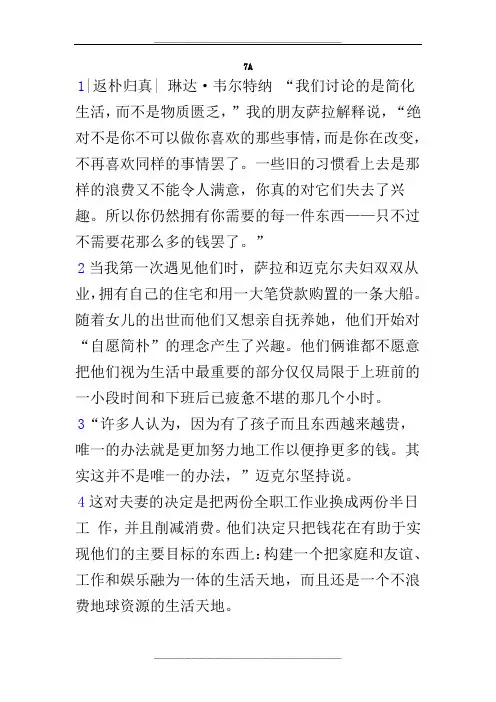
7A1|返朴归真| 琳达·韦尔特纳“我们讨论的是简化生活,而不是物质匮乏,”我的朋友萨拉解释说,“绝对不是你不可以做你喜欢的那些事情,而是你在改变,不再喜欢同样的事情罢了。
一些旧的习惯看上去是那样的浪费又不能令人满意,你真的对它们失去了兴趣。
所以你仍然拥有你需要的每一件东西——只不过不需要花那么多的钱罢了。
”2当我第一次遇见他们时,萨拉和迈克尔夫妇双双从业,拥有自己的住宅和用一大笔贷款购置的一条大船。
随着女儿的出世而他们又想亲自抚养她,他们开始对“自愿简朴”的理念产生了兴趣。
他们俩谁都不愿意把他们视为生活中最重要的部分仅仅局限于上班前的一小段时间和下班后已疲惫不堪的那几个小时。
3“许多人认为,因为有了孩子而且东西越来越贵,唯一的办法就是更加努力地工作以便挣更多的钱。
其实这并不是唯一的办法,”迈克尔坚持说。
4这对夫妻的决定是把两份全职工作业换成两份半日工作,并且削减消费。
他们决定只把钱花在有助于实现他们的主要目标的东西上:构建一个把家庭和友谊、工作和娱乐融为一体的生活天地,而且还是一个不浪费地球资源的生活天地。
5现在他们还在原来的那个近郊社区,住在一幢自己设计的、漂亮而节能的房子里。
按许多标准来看,房子虽然小了点,却容易清扫、布置、维修和供暖。
一层是个大房间,厨房靠墙,摆着一张桦木餐桌和吃饭用的几把椅子;一张舒适的长沙发和一个柴炉就把日常起居的范围圈定了;角落是工作区。
楼上是他们的卧室、一个萨拉和迈克尔共用的办公室和一间浴室。
整幢房子明亮简洁,同周围环境十分和谐。
很快,前门外还要建一个太阳能温室。
6一对只有兼职工作的夫妻怎么会有钱建造自己的房子、拥有一辆汽车并同另一对夫妻共享一艘小船,而且所有这一切都不曾贷款呢?他们如何能够维持足以提供他们想要的“一切”的那样一种高生活水平呢?他们放弃的而且不再怀念是哪些东西呢?7首先,他们放弃了乱七八糟的昂贵东西:(浴室)药柜里满满的从来不用的化妆品和在柜台上随时可以买到的药品;堆放在厨房壁柜里的最终只会丢弃的各种东西。
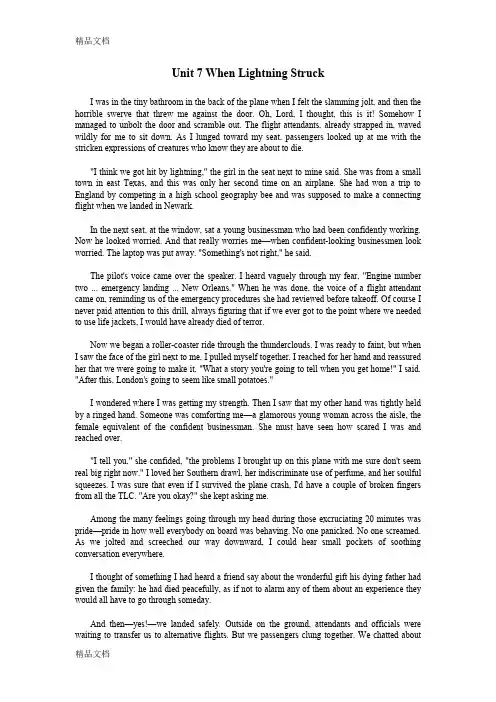
Unit 7 When Lightning StruckI was in the tiny bathroom in the back of the plane when I felt the slamming jolt, and then the horrible swerve that threw me against the door. Oh, Lord, I thought, this is it! Somehow I managed to unbolt the door and scramble out. The flight attendants, already strapped in, waved wildly for me to sit down. As I lunged toward my seat, passengers looked up at me with the stricken expressions of creatures who know they are about to die."I think we got hit by lightning," the girl in the seat next to mine said. She was from a small town in east Texas, and this was only her second time on an airplane. She had won a trip to England by competing in a high school geography bee and was supposed to make a connecting flight when we landed in Newark.In the next seat, at the window, sat a young businessman who had been confidently working. Now he looked worried. And that really worries me—when confident-looking businessmen look worried. The laptop was put away. "Something's not right," he said.The pilot's voice came over the speaker. I heard vaguely through my fear, "Engine number two ... emergency landing ... New Orleans." When he was done, the voice of a flight attendant came on, reminding us of the emergency procedures she had reviewed before takeoff. Of course I never paid attention to this drill, always figuring that if we ever got to the point where we needed to use life jackets, I would have already died of terror.Now we began a roller-coaster ride through the thunderclouds. I was ready to faint, but when I saw the face of the girl next to me, I pulled myself together, I reached for her hand and reassured her that we were going to make it, "What a story you're going to tell when you get home!" I said. "After this, London's going to seem like small potatoes."I wondered where I was getting my strength. Then I saw that my other hand was tightly held by a ringed hand. Someone was comforting me—a glamorous young woman across the aisle, the female equivalent of the confident businessman. She must have seen how scared I was and reached over."I tell you," she confided, "the problems I brought up on this plane with me sure don't seem real big right now." I loved her Southern drawl, her indiscriminate use of perfume, and her soulful squeezes. I was sure that even if I survived the plane crash, I'd have a couple of broken fingers from all the TLC. "Are you okay?" she kept asking me.Among the many feelings going through my head during those excruciating 20 minutes was pride—pride in how well everybody on board was behaving. No one panicked. No one screamed. As we jolted and screeched our way downward, I could hear small pockets of soothing conversation everywhere.I thought of something I had heard a friend say about the wonderful gift his dying father had given the family: he had died peacefully, as if not to alarm any of them about an experience they would all have to go through someday.And then—yes!—we landed safely. Outside on the ground, attendants and officials were waiting to transfer us to alternative flights. But we passengers clung together. We chatted aboutthe lives we now felt blessed to be living, as difficult or rocky as they might be. The young businessman lamented that he had not a chance to buy his two little girls a present. An older woman offered him her box of expensive Lindt chocolates, still untouched, tied with a lovely bow. "I shouldn't be eating them anyhow," she said. My glamorous aisle mate took out her cell phone and passed it around to anyone who wanted to make a call to hear the reassuring voice of a loved one.There was someone I wanted to call. Back in Vermont, my husband, Bill, was anticipating my arrival late that night. He had been complaining that he wasn't getting to see very much of me because of my book tour. I had planned to surprise him by getting in a few hours early. Now I just wanted him to know I was okay and on my way.When my name was finally called to board my new flight, I felt almost tearful to be parting from the people whose lives had so intensely, if briefly, touched mine.Even now, back on terra firma, walking down a Vermont road, I sometimes hear an airplane and look up at that small, glinting piece of metal. I remember the passengers on that fateful, lucky flight and wish I could thank them for the many acts of kindness I witnessed and received. I am indebted to my fellow passengers and wish I could pay them back.But then, remembering my aisle mate's hand clutching mine while I clutched the hand of the high school student, I feel struck by lightning all over again: the point is not to pay back kindness but to pass it on.闪电来袭当我感到猛烈摇晃时我正在飞机尾部的小卫生间。
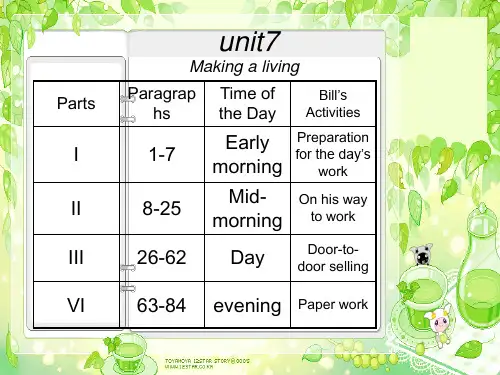
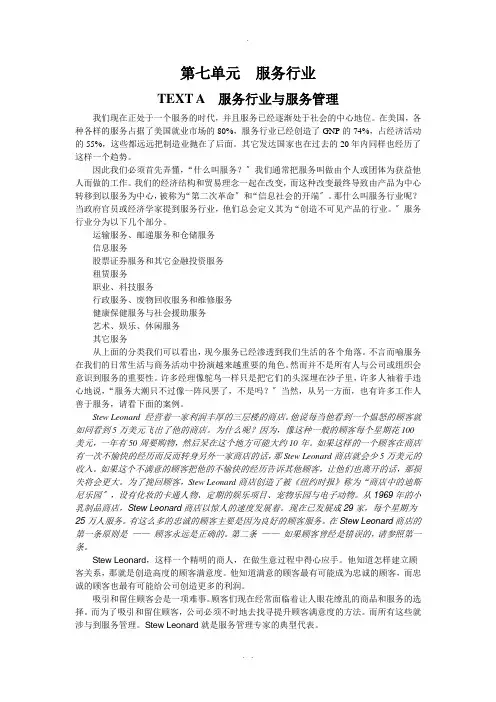
第七单元服务行业TEXT A 服务行业与服务管理我们现在正处于一个服务的时代,并且服务已经逐渐处于社会的中心地位。
在美国,各种各样的服务占据了美国就业市场的80%,服务行业已经创造了GNP的74%,占经济活动的55%,这些都远远把制造业抛在了后面。
其它发达国家也在过去的20年内同样也经历了这样一个趋势。
因此我们必须首先弄懂,“什么叫服务?〞我们通常把服务叫做由个人或团体为获益他人而做的工作。
我们的经济结构和贸易理念一起在改变,而这种改变最终导致由产品为中心转移到以服务为中心,被称为“第二次革命〞和“信息社会的开端〞。
那什么叫服务行业呢?当政府官员或经济学家提到服务行业,他们总会定义其为“创造不可见产品的行业。
〞服务行业分为以下几个部分。
运输服务、邮递服务和仓储服务信息服务股票证券服务和其它金融投资服务租赁服务职业、科技服务行政服务、废物回收服务和维修服务健康保健服务与社会援助服务艺术、娱乐、休闲服务其它服务从上面的分类我们可以看出,现今服务已经渗透到我们生活的各个角落。
不言而喻服务在我们的日常生活与商务活动中扮演越来越重要的角色。
然而并不是所有人与公司或组织会意识到服务的重要性。
许多经理像鸵鸟一样只是把它们的头深埋在沙子里,许多人袖着手违心地说,“服务大潮只不过像一阵风罢了,不是吗?〞当然,从另一方面,也有许多工作人善于服务,请看下面的案例。
Stew Leonard 经营着一家利润丰厚的三层楼的商店。
他说每当他看到一个愠怒的顾客就如同看到5万美元飞出了他的商店。
为什么呢?因为,像这种一般的顾客每个星期花100美元,一年有50周要购物,然后呆在这个地方可能大约10年。
如果这样的一个顾客在商店有一次不愉快的经历而反而转身另外一家商店的话,那Stew Leonard商店就会少5万美元的收入。
如果这个不满意的顾客把他的不愉快的经历告诉其他顾客,让他们也离开的话,那损失将会更大。
为了挽回顾客,Stew Leonard商店创造了被《纽约时报》称为“商店中的迪斯尼乐园〞,设有化妆的卡通人物、定期的娱乐项目、宠物乐园与电子动物。
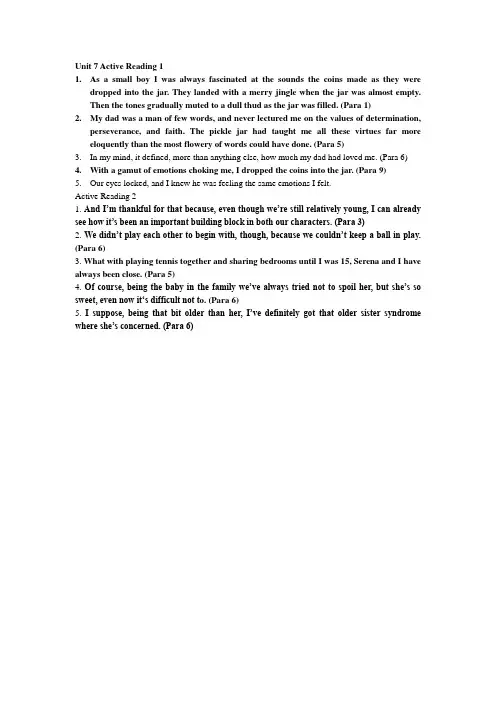
Unit 7 Active Reading 11.As a small boy I was always fascinated at the sounds the coins made as they weredropped into the jar. They landed with a merry jingle when the jar was almost empty.Then the tones gradually muted to a dull thud as the jar was filled. (Para 1)2.My dad was a man of few words, and never lectured me on the values of determination,perseverance, and faith. The pickle jar had taught me all these virtues far more eloquently than the most flowery of words could have done. (Para 5)3.In my mind, it defined, more than anything else, how much my dad had loved me. (Para 6)4.With a gamut of emotions choking me, I dropped the coins into the jar. (Para 9)5.Our eyes locked, and I knew he was feeling the same emotions I felt.Active Reading 21. And I’m thankful for that because, even though we’re still relatively young, I can already see how it’s been an important building block in both our characters. (Para 3)2. We didn’t play each other to begin with, though, because we couldn’t keep a ball in play. (Para 6)3. What with playing tennis together and sharing bedrooms until I was 15, Serena and I have always been close. (Para 5)4. Of course, being the baby in the family we’ve always tried not to spoil her, but she’s so sweet, even now it‘s difficult not t o. (Para 6)5. I suppose, being that bit older than her, I’ve definitely got that older sister syndrome where she’s concerned. (Para 6)。
当医生不告知真相时——鲍林·W·陈医生总是告诉你全部事实吗?每年春天,我以前的一名患者和他年迈的父母都会开车两小时到医院为工作人员带来巧克力——为了庆祝他几年前肝移植成功。
这名30岁左右的患者个子很高,一头棕色的头发。
他分发着盒子。
他的父母,满脸沧桑却洋溢着幸福的微笑,和每个人握手。
但是,每一次这对夫妇向我走来的时候,都好似有瞬间的犹豫。
在他们儿子接受移植手术的当晚,我作为医生,向他们传达了患者所处状态的残酷细节。
当患者躺在重症监护室等待器官时,我向他的父母描述了他的情况:深度昏迷、完全依赖呼吸机;血液清淡如水,需要大剂量的静脉输液维持血压;如不尽快手术,将他挪到数百英尺以外的手术室进行移植手术来救命将是不可能的。
我认为真诚是作为他们儿子的医生的责任,所以我告诉他们,他们唯一的孩子可能会死去。
幸运的是,这可怕的预测被证明是不正确的。
我从未质疑过医生诚实的重要性,但是,每年这对夫妇和他们的儿子来到医院的时候,我又会感到困惑:是否我忠于职业理想,却付出了巨大的代价——他们的希望。
根据上个月在《卫生事务》杂志发表的一项研究,我不是唯一与透明化和诚信化斗争的医生。
波士顿马萨诸塞州摩根卫生政策研究所的研究人员基于《医学专业章程》展开了一项调查。
《医学专业章程》制定了职业行为准则,这一准则已被广泛接受。
它支持患者自主权,指出了医生诚实和透明化的重要作用。
参与调查的医生收到了20美元,并就他们在过去一年的态度和行为接受了问询。
虽然接受调查的近2000名医生中的大部分认为医生不应该对患者撒谎,也不应该不去告知某一手术或治疗的风险和益处,但是,大量医生也透露他们在过去的一年并未做到完全诚实和透明化。
超过半数的医生在进行预后描述时过度乐观。
超过10%的医生说过与事实不符的内容。
虽然几乎所有医生都提到他们认为机密的健康信息应该在获得授权的情况下才能透露,但是,超过三分之二的医生曾经在未获患者许可的情况下向其他人透露过私密的健康信息。
---------------------------------------------------------------最新资料推荐------------------------------------------------------Unit 7 课文翻译Unit 7 Passage I 永远不会听到的毕业典礼演说我们这些教师对于在你们身上取得的教育成就一点都不感到自豪。
我们培养你们去适应的是一个根本不存在的世界事实上也是不可能存在的。
在这里度过的四年时间里,你们一直以为失败是不会留下任何记录的。
要是学得不好,一个最省事的办法就是中途退出(不修这门课),在布朗大学你们学会了这一点。
但是,从现在开始,在你们要涉足的世界里,失败是要给你留下疤痕的。
知难而退也会使你变成另一个人。
走出布朗,知难而退的人绝不是英雄。
你们可以跟我们争辩,说服我们为什么你们的错误不是错误,为什么平庸的作业是优秀的,为什么你们会对普普通通并不出色的课堂报告感到骄傲。
回想一下,毕竟你们中的大多数人在你们所学的大部分课程中都得了高分。
因此,在这里分数并不能作为区分优秀学生与学业平平的学生的依据。
但是,今后,在你们所要去的世界里,你们最好不要为自1 / 6己的错误辩护,而应该从中吸取教训。
假如你们要求得到你们不该得到的表扬,诋毁那些不给你们表扬的人,这是不明智的做法。
多年来,我们创造了一个完全宽容的世界。
这里所要求于你们的仅仅是一点微不足道的努力。
当你们没有按约定的时间赴约时,我们就再约时间。
当你们没有按期交作业时,我们装作不在乎。
更糟糕的是,当你们的言谈枯燥无味时,我们却装作你们说的是重要的事情;当你们喋喋不休、不知所云时,我们认真倾听,似乎你们说的东西事关重大;当你们把根本没有花心思写的作业扔到我们桌上时,我们不仅拜读,甚至批改给评语,好像值得为你们这样做似的。
当你们犯傻时,我们装作你们聪明过人;当你们老生常谈、毫无想象力、平平淡淡时,我们却装作像在听什么美妙绝伦的新鲜事情一样;当你们要不劳而获时,我们拱手奉上。
人教版八年级下册英语unit7课文翻译英语是国际经济、技术、信息等交流中应用最广泛的语言,也是我国八年级基础教育中最主要的外语课程。
店铺为大家整理了人教版八年级下册英语unit7的课文翻译,欢迎大家阅读!人教版八年级下册英语unit7课文翻译(一)P50,2d导游:请随便问我关于今天长城之旅的任何问题。
游客:长城有多长?导游:哦,最常见的问题!如果我们只谈论明长城的话,大约长8850千米。
这使它成为世界上最长的城墙。
游客2:喔,真是令人惊叹!古代的皇帝们为什么修建长城呢?导游:主要的原因是为了保护中国。
正如你们所看到的,它很高很宽。
据我所知,没有人造物体和这一样大。
游客3:八达岭是明长城的一部分吗?导游:是的,它是最著名的一部分。
3a阅读文章,将每个段落和段落大意搭配起来。
第一段登山者的精神第二段登山者的成就第三段事实和危险珠穆朗玛峰---世界上最危险的山峰?世界上最危险的运动之一是登山运动,并且最受欢迎的登山地点之一是喜马拉雅山脉。
喜马拉雅山脉横亘中国西南地区。
在所有的山峰中,珠穆朗玛峰最高、最著名。
它高8844.43米,所以攀登很危险。
乌云盖顶,并且雪会下得很大。
更大的困难包括冰冻气候条件和强烈的暴风雪。
当你接近山顶的时候,呼吸也很困难。
丹增•诺尔盖和埃德蒙•希拉里于1953年5月29日成为第一批登顶的人。
第一支中国登山队于1960年登顶。
来自日本的田部井淳子于1975 年成为第一位成功登顶的女性。
为什么这么多登山者要冒生命危险呢?主要原因之一是人们想在困难面前挑战自己。
这些登山者的精神向我们展示了在尽力实现梦想的路上要永不言弃。
它也展示了有时人类可以比自然力量更加强大。
人教版八年级下册英语unit7课文翻译(二)P52语法聚焦世界上最高的山是什么? 珠穆朗玛峰。
珠穆朗玛峰有多高? 它高8844.43米。
它比其他任何一座山都高。
世界上最深的咸水湖是哪个? 里海是所有咸水湖中最深的。
你知道中国是世界上最古老的国家之一吗?是的,我知道。
Unit7 Time to Stop Excuses for Lateness P1 Listening and Speaking Activities1 BrainstormingExpressions of disciplinary matters at the workplace:Expressions of types of employment:Expressions of recruiting/firing:Expressions of positions/job titles:2 ListeningListening scriptI'm a policeman in New York City and my name is John Davy. Ever since I was a young boy I’ve always wanted to be a cop .I thought it would be the best job in the world. If I wasn't a cop, I don't think I could be anything else. Of course they tell me I'm a good cop. My superiors say I'm conscientious, that I have strong sense of justice and fairness and a great respect for the law. To be honest with you, my conscience would bother me if I didn't give 100% and if I didn't try to live up to my ideals. My friends tell me I'm too idealistic, too nice and, as the saying goes, nice guys finish last , but my job is to serve the people and I try to do my best.I work with the police department's emergency service patrol in a largely black neighborhood in Brooklyn, New York. It's a rough and dangerous neighborhood, very rough. I admit it hasn't been easy. Since being assigned to the neighborhood, I've been shot, spit at, and hit with bottles, rocks, sticks, and Molotov Cocktails . Yes, it's not easy being a cop in New York City , but I've been awarded citations for my courage and for my quick thinking and performance in emergency situations.Oh, I could tell you many exciting stories. Once, we set up a net for a potential jumper. A young man was on a ledge 23 stories up from the street. His girlfriend had left him and now he was threatening to jump. We got his girlfriend, his close friend, a priest, his mother to try and talk him out of jumping, but nothing worked. He was going to jump. Then I started to talk to him. I talked as long as I could — until I got too close to him. Then he shouted out, "Stop right where you are or I'll jump." I backed away. An hour later, with a belt tied around me, with a line my partner held, I jumped from the ledge and came up right in front of the young man and trapped him. I felt what they call "job satisfaction". A life has been saved and that's important to me. To me that's success - to do your job and to do it well. No holding back , especially when it means saving a human life.Some people in the neighborhood think cops are the bad guys. They just don't like us. Yeah, we have some bad cops in the department who don't always obey the rules and who sometimes use too much force and injure people. But you know, when someone has been hit by a car and you walk into the crowd standing around dumbfounded and you take charge, telling this person to get a blanket, this one to get some water, and you comfort the injured person; that looks good in front of the crowd. They say, "There’re some good cops here." Boy, does that make me feel good. I feel like I'm doing my job . I feel like I'm helping people. Anyway, it's my duty as a cop.Recently, I was again cited for outstanding service and this time was promoted to sergeant. As they say, I'm a good cop, and good guys don't always finish last.1. What makes John a good policeman?John likes his job as a cop. He feels it's "the best job in the world." He is conscientious, has a strong sense of justice and fairness, and respects the law. John exerts himself to the utmost and tries to live up to his ideals.2. Has John’s job as a policeman been easy and safe?No. Being a policeman in New York is difficult and dangerous. Besides, he works in a rough neighborhood. He has been shot, spit at, and hit with bottles, rocks, sticks, and Molotov Cocktails. Once he risked his life to save a man from jumping off a ledge 23 stories up from the street.3. Why was John awarded citations?John is given awards for his bravery, his quick thinking and performance in emergencies.4. Why don’t some people like policemen in John’s district?John admits that there are bad cops on the force, cops who don't always obey the rules and who sometimes use too much force and injure people.Text Translation别再为迟到找借口哈里·贝地每个办公室总有那么几个人习惯上班迟到。
Unit7课文翻译课文ASurviving an economic crisis经济危机中求生存1.许许多多的人正经历的这场经济萧条发端于美国。
对抵押贷款监管不力,致使当时的风险评估远低于现在的最终结果。
由于大量的房产所有人无法偿还贷款,负责监管的公司、放贷的公司(以及其子公司及股份持有者)都损失了大笔的金钱。
这些巨额亏损的后果很快就影响到美国就业市场,造成下岗或解雇。
经济复兴迟迟不来。
许多人几个月来都是苦苦挣扎,正如下面故事中的主人公那样。
2.苏•约翰逊有好几个月都未付房租了,面临着被逐出的境地,她把能塞进她的那辆双门轿车的东西都打包收拾好,离城而去。
3.她最后在一家汽车旅馆落脚,交付了260美元的定金,这还是她设法从朋友那儿以及卖掉家具后凑齐的,是苏在失业救济金被终止后所有的余钱。
她面临流浪生活,这在以前是难以想象的,而她不久以前都还在大都市里一家公司供职,并就读于商学院研究生班。
4.苏明白自己最终很可能以车为家。
她如今已成为倒霉的失业群体中的一份子,他们自称“99周人”,因为他们已经领完至多9周的失业保险救济金。
5.根据劳动统计局的数据,长期失业率已达到创纪录的水平。
些许的失业救济金对那些失去工作的人来说可是救命钱,这使他们不至于形貌落魄,无立锥之地;不至于无钱加油,缴不起电费话费。
6.一旦收不到失业救济支票,哪怕是像苏这样曾经贵为技术公司客服经理的人,也会日益跌入经济窘迫的深渊;原有工薪阶层或中产阶级的最后一抹荣光也已消逝不在,所有人都前途未卜。
7.当苏收到最后一笔失业救济支票时,阵阵悲凉涌上心头。
由于没有收入进账,苏的活期账户余额转为负值。
汽车行将被收回!而且信贷公司不断骚扰,催还车贷,让她成天压力倍增。
每天,苏就像乒乓球一样在信心和绝望之间起落不定。
8.生活境遇真是令人痛心地一落千丈!想想仅在短短的一年半之前,苏在原有工作岗位上可挣到56,00美元的年薪,可在像墨西哥、加勒比那样的地方度假,还就读于名校商学院。
这份材料是本人上网找的,只有部分单元(缺第一,第四,第八,第十一),这些翻译也许不是最好的,大家如果不满意,自己上网找Unit twoThe most intensive(强烈的) study I ever made of tourists was at Torcello,where it is impossible to avoid them.Torcello is a minute island in the Venetian lagoon(泻湖);here among vineyards and wild flowers,some thirty cottages surround a great cathedral(大教堂)which was being built when William the Conqueror came to England.我所做过的关于游客的最透彻的研究是在Torcello完成的,在那里你根本没法避开他们。
Torcello是威尼斯泻湖上一个很小的岛屿:这里的葡萄园和野花间散布了大概三十间村舍,环绕着建立于征服者威廉到达英国时期的一座大教堂。
A canal and a path lead from the lagoon to the village;the vineyards are intersected (分隔的)by canals ;red and yellow sails (帆船)glide slowly through the vines.Bells from the campanile (钟塔)ring out reproaches three time a day ("cloches,cloches,divins reproches")joined by a chorus from the surrouonding islands.一座运河和一条小道将泻湖和村庄连结起来;运河蜿蜒而过将葡萄园隔开;红色和黄色的船帆缓慢地穿梭于葡萄藤之间。
仅做参考 好好学习,天天向上
Unit 7 Part B Global Food Insecurity 全球粮食匮乏
A particular problem directly related to continuing population growth is growing global food insecurity. For a variety of reasons the demand for food by the consumer has begun to outrun the capacity to provide. Where all attention was previously focused on population growth as the sole source of demand on available food stocks, today an equally important source of demand has become apparent and that is affluence. As per capita income increases, purchasing power climbs and with it a demand for higher quality foods , especially foods of animal origin such as meat, eggs, milk, and milk products. Eating meat can be considered an inefficient way of utilizing grain. In the United States it takes three pounds of grain to produce a pound of poultry; 5 : 1 is the ratio for pork, and 10:1 for beef. In the end, Americans eat eighty percent of all the grain they consume indirectly, first using it for feed and then consuming the meat. On the basis of these data, Americans consume the equivalent of one ton of grain a year while inhabitants of poorer countries consume one fifth as much. Outside our borders, other nations with growing economies but without comparable agriculture have also increased their appetites for animal protein. Hence, sixty percent of North American agricultural sales has been to nations whose people are already rather well fed. At this time, the approximately one billion people of the developed world feed enough grain to their livestock and poultry to provide minimal nutritional requirements to another 2 billion people. Over the last twenty years, the rich minority of the world has doubled its meat consumption. This is, however, not due to eating twice as much meat per capita, although there has been some rise here. Rather, there are twice as many people with the money to buy a higher quality protein-rich diet. The net result is that while world population has been growing at 1. 6 percent and agricultural production at 2. 5 percent, world demand for food has been increasing at 3 percent per year. 人口的持续增长带来了与此直接相关的与日俱增的全球粮食匮乏的特殊问题。众多的原因导致了消费者对粮食的需求已经超出了能够提供的能力。之前所有的注意力都放在人口数量增加上,以为其对食物储备供应的唯一来源,而现在一个同等重要的来源已经变得明显,那就是充足的储备。随着人均收入的增加,消费能力的提升,人们提出了高品质食物的要求,特别是动物制品的来源,如肉类、鸡蛋、牛奶及奶制品等。吃肉被认为是谷物的无效利用。在美国,花三磅重的谷物才能喂养出一磅重的家禽,即3:1的比例,猪肉的比例是5:1,牛肉是10:1。最终,美国人间接吃了80%的谷物,包括直接吃的谷物和用来喂养动物的。在这些数据的基础之上,美国人一年消费一吨的谷物,而那些较穷国家的居民最多达到五分之一。我们边境周围的其它国家在经济增长和农业增长不相匹配时仍然增大对动物蛋白的胃口。因此,北美农业60%都是提供给那些生活水平已经很好的国家。同时,近10亿发达国家的人们喂养足够的谷物给家禽和牲畜为了提供极少的营养需求给另外20亿人口。在过去的二十年里,少数的富人已经加倍了肉的消费。这就意味着,不是人均吃了两倍的肉,尽管也有一些增加,而是有两倍多的人用钱买了更高品质的高蛋白饮食而已。网络调查表明,当世界人口增长到1.6%而农业产量在2.5%的时候,世界对食物的需求就会每年增长3%。
It is to our advantage and the world' s as well that the United States grain harvests in the years 1975 — 1977 have resulted in bumper yields. Overflowing granaries and low grain prices are the mark of this high productivity. But the great increases in food production have not occurred where populations are growing the fastest. Gains in production require modern energy intensive methods combining irrigation, pesticides herbicides, fertilizers, genetics, and mechanization. One reason, among several, why poor countries have lagged behind in food production is because their farmers have not had access to appropriate technologies, such as sufficient fertilizers, irrigation, improved seeds, pesticides, storage facilities, and transportation. The world's poor are thus driven to world food markets to supplement their needs. However, they must compete there with richer nations whose own increased demands have forced the price of grain upward. Caught in the price-squeeze of competition in which rising food prices outstrip purchasing power, the poor countries can buy less and less with their precious dollars. So today, we have the producer nations with surpluses to sell, the affluent consumer nations who have money to buy, and the low income consumer countries that can't effectively compete in the world food markets. World hunger is sustained by scarcity promoted by the economic system of rich countries. According to some estimates, world agriculture could produce enough to feed up to 30 billion people. What appears to be a food shortage may, in fact, be an uneven